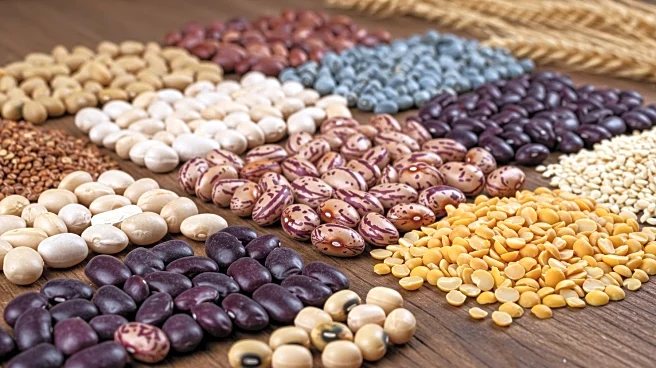What's Happening?
The U.S. Department of Agriculture (USDA) has released updated estimates indicating a decline in dry edible bean production in the United States for 2025. Despite improved yields, the reduction in harvested area is expected to lead to lower overall production. The USDA's report forecasts average edible bean yields at 2,203 pounds per acre, an increase of 122 pounds per acre compared to the previous year. However, the harvested area is projected to decrease by 9.3%, totaling 1.364 million acres. North Dakota, the largest producer of edible beans in the country, is expected to see an 18% reduction in harvested area, amounting to 590,600 acres. Consequently, total edible bean production is forecasted at 1.363 million tonnes, down from 1.419 million tonnes in the previous year.
Why It's Important?
The decline in edible bean production has significant implications for the agricultural sector and related industries in the United States. Edible beans are a crucial component of the U.S. agricultural output, and a reduction in production could impact supply chains, pricing, and export markets. North Dakota's substantial decrease in harvested area highlights regional challenges that may affect local economies reliant on agriculture. The forecasted drop in production could lead to increased prices for consumers and affect food manufacturers who depend on these beans as raw materials. Additionally, the reduction in production may influence trade dynamics, as the U.S. is a major exporter of edible beans.
What's Next?
Stakeholders in the agricultural industry, including farmers, suppliers, and policymakers, will need to address the challenges posed by the reduced harvested area. Efforts may focus on optimizing yield through advanced agricultural practices or exploring alternative crops to mitigate the impact of decreased bean production. The USDA and other agricultural bodies might consider initiatives to support affected regions, particularly North Dakota, to sustain their economic stability. Monitoring weather patterns and market demands will be crucial in adapting strategies to ensure the resilience of the edible bean sector.
Beyond the Headlines
The reduction in edible bean production may prompt discussions on sustainable agricultural practices and land management. As climate change and environmental factors increasingly affect crop yields, there is a growing need for innovative solutions to enhance productivity without expanding land use. This situation could lead to increased investment in agricultural technology and research to develop more resilient crop varieties and efficient farming techniques.








